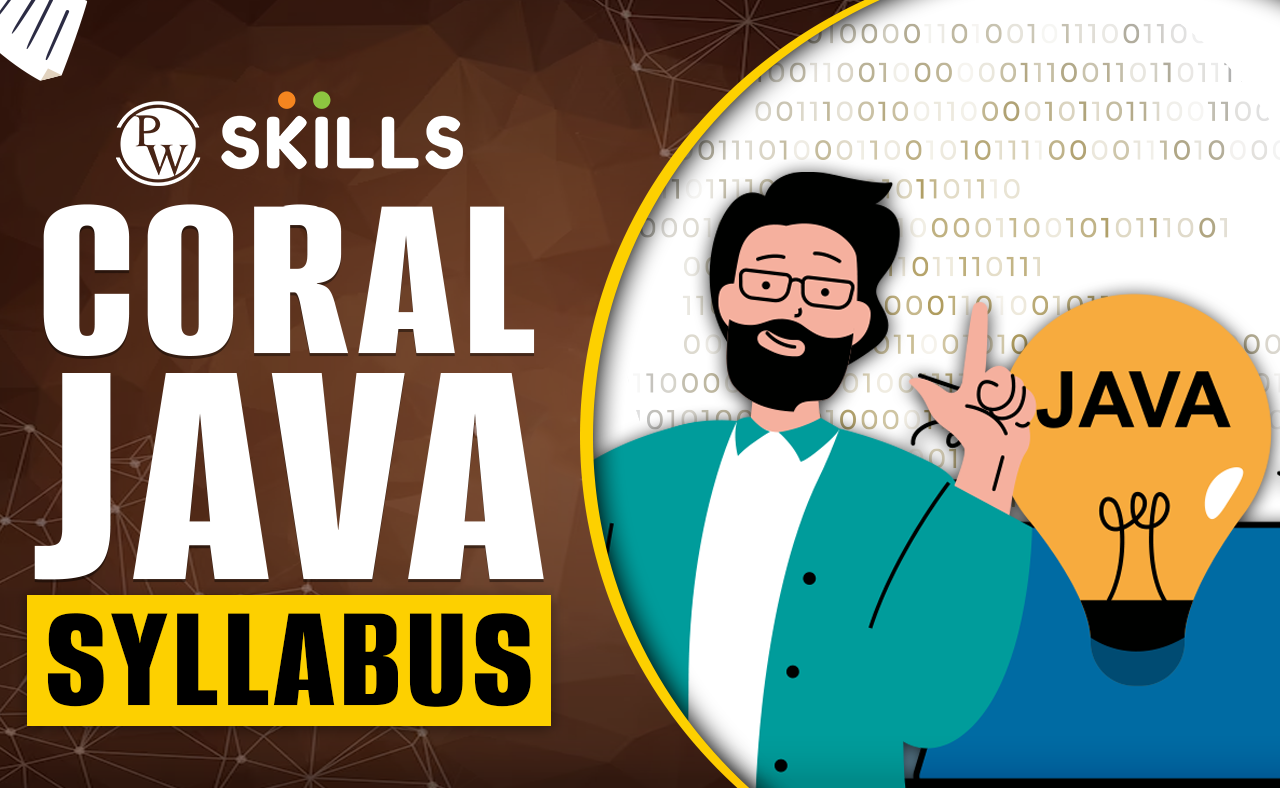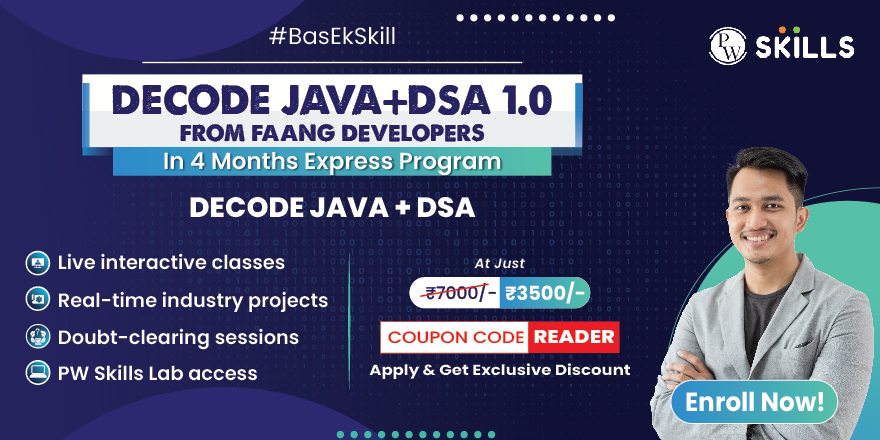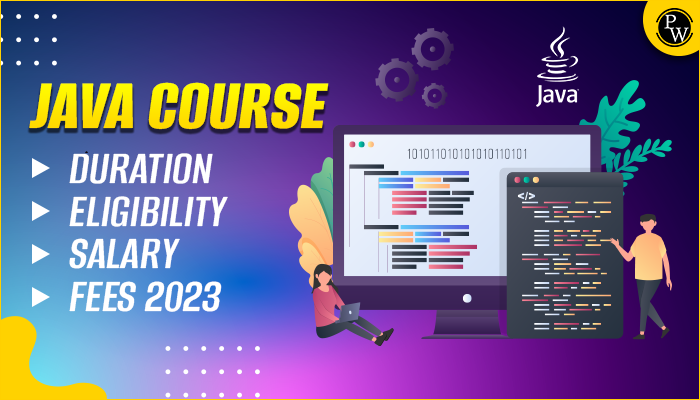Core Java syllabus involves a structured syllabus covering fundamental concepts, syntax, object-oriented programming principles, and practical skills necessary to build a strong foundation in Core Java.
Core Java Syllabus: The term “Core” signifies the fundamental essence of a concept, and in this context, ‘Core Java’ embodies the foundational aspects of the Java programming language. As a widely recognized and extensively utilized programming language, Java is the starting point for beginners, with Core Java laying the groundwork before progressing to Advanced Java.
Operating on Object-Oriented Programming (OOP) principles, Java is a versatile language with a profound depth of knowledge required for mastery. Java’s expanse is vast, akin to an ocean, demanding continuous exploration to fathom its intricacies. Being platform-independent and robust, Java adheres to the WORA—Write Once, Run Anywhere principle.
While the Core Java syllabus itself is comprehensive, it is customary for beginners to initiate their learning journey with Core Java, recognizing that it serves as the foundational bedrock. Core Java is not distinct from Java; rather, it constitutes a pivotal segment within the spectrum of Java editions. You can download the core Java topics list PDF to get instant access to the syllabus.
Java encompasses various editions, and Core Java is an integral component within one such edition. Through grasping the core concepts, beginners forge a solid understanding, paving the way for a comprehensive comprehension of the broader Java programming language.
“Decode Java+DSA 1.0″ by Physics Wallah” is a comprehensive course that seamlessly integrates Core Java and data structures and algorithms (DSA), offering a holistic approach to programming proficiency. Designed to empower learners with a robust foundation, this course delves into the intricacies of Java programming, providing hands-on experience and insights into the principles of data structures and algorithms.
Recommended Technical Course
- MERN Full Stack Development Course
- Generative AI Course
- System Design Workshop
- Java+DSA 1.0 Course
- Full Stack Web Dev 1.0 Course
- Data Science with ML 1.0 Course
What is Core Java?
Core Java refers to the fundamental components and libraries of the Java programming language, emphasizing Object-Oriented Programming (OOP) principles.
It constitutes the base language features without advanced functionalities. Core Java serves as a foundation for more specialized Java applications.
Java Editions
The Java Programming Language supports distinct editions, each catering to specific development needs:
1) Java ME (Java Micro Edition):
Java ME, the micro edition, is tailored for developing mobile phone applications. It provides a streamlined framework for creating applications designed for mobile devices. As such, Java ME is the preferred choice for developers venturing into mobile application development.
2) Java SE (Java Standard Edition):
Java SE serves as a computing-based platform primarily utilized for crafting desktop or Windows-based applications. Core Java constitutes an integral part of Java SE, enabling developers to create desktop applications using fundamental Java concepts. The Java Development Kit (JDK) serves as a well-known Java SE implementation in this context.
3) Java EE (Java Enterprise Edition):
Also recognized as Java 2 Platform or J2EE, Java EE is the enterprise platform designed for server-based application development, emphasizing enterprise-level projects. This edition is specifically employed for web development, facilitating the creation of robust and scalable server-side applications.
Also read: Top 10 Java Libraries Every Java Developer Should Know
Core Java Syllabus for Beginners
A beginner-friendly Core Java syllabus typically covers foundational concepts and programming skills. Here’s a comprehensive syllabus suitable for beginners:
Module 1: Introduction to Java
1.1 Overview of Java Programming Language
- History and Evolution
- Features of Java
- Java Virtual Machine (JVM)
1.2 Setting up Java Development Environment
- Installing Java Development Kit (JDK)
- Configuring Integrated Development Environment (IDE)
Module 2: Java Basics
2.1 Structure of a Java Program
- Main method
- Statements and expressions
2.2 Variables and Data Types
- Primitive data types (int, float, char, boolean)
- Declaring and initializing variables
2.3 Operators and Expressions
- Arithmetic, relational, and logical operators
- Operator precedence
Module 3: Control Flow Statements
3.1 Conditional Statements
- if, else if, else statements
- Switch-case statements
3.2 Looping Statements
- for while, do-while loops
- Enhanced for loop
Module 4: Object-Oriented Programming (OOP) Concepts
4.1 Introduction to OOP
- Objects and Classes
- Inheritance, Polymorphism, Encapsulation, and Abstraction
4.2 Constructors and Destructors
- Default and parameterized constructors
- Garbage collection
Module 5: Exception Handling
5.1 Understanding Exceptions
- Types of exceptions
- Exception hierarchy
5.2 Try-Catch Blocks
- Handling exceptions
- Throwing exceptions
Module 6: File Handling
6.1 Reading and Writing to Files
- File I/O basics
- Working with FileReader and FileWriter
Module 7: Collections Framework
7.1 Overview of Collections
- List, Set, Map
- ArrayList, LinkedList, HashSet, HashMap
7.2 Iterators and Enumerations
- Traversing collections
- Understanding iterators
Module 8: Multithreading
8.1 Introduction to Threads
- Creating and running threads
- Thread synchronization
8.2 Thread Safety and Deadlock
- Avoiding common multithreading pitfalls
Module 9: Introduction to Java API
9.1 Working with Java Standard Libraries
- Utilizing predefined classes and methods
Module 10: Basic Design Patterns
10.1 Understanding Common Design Patterns
- Singleton, Factory, Observer
Module 11: Unit Testing with JUnit
11.1 Introduction to JUnit
- Writing and executing test cases
Module 12: Basic GUI Programming (Optional)
12.1 Introduction to AWT and Swing
- Creating simple graphical interfaces
Module 13: Introduction to JDBC
13.1 Connecting to Databases
- Executing SQL queries
This syllabus provides a structured approach to learning Core Java for beginners. Hands-on exercises, coding projects, and assessments should be integrated to reinforce the concepts covered in each module.
Also read: Top 15 Java Projects With Source Code [2024]
Core Java Concepts Covered in Java Courses
Java courses, especially those covering Core Java, typically include a comprehensive set of fundamental concepts essential for building a solid foundation in Java programming. Here are some core Java concepts commonly covered in Java courses:
1) Introduction to Java:
- Overview of Java programming language.
- History and evolution of Java.
- Features and advantages of Java.
2) Java Development Environment:
- Installation of Java Development Kit (JDK).
- Setting up Integrated Development Environments (IDEs) like Eclipse or IntelliJ IDEA.
3) Basic Syntax:
- Structure of a Java program.
- Data types, variables, and constants.
- Comments and documentation.
4) Control Statements:
- Conditional statements (if, else, if, else).
- Switch-case statements.
- Looping statements (for, while, do-while).
5) Object-Oriented Programming (OOP):
- Concepts of objects and classes.
- Inheritance, polymorphism, encapsulation, and abstraction.
- Constructors and destructors.
6) Exception Handling:
- Understanding exceptions and errors.
- Try-catch blocks.
- Custom exception handling.
7) File Handling:
- Reading and writing to files.
- Working with input and output streams.
8) Collections Framework:
- Overview of collections (List, Set, Map).
- Iterators and Enumerations.
- ArrayList, LinkedList, HashMap, etc.
9) Multithreading:
- Introduction to threads.
- Synchronization and coordination.
- Thread safety and deadlock.
10) Introduction to Java API:
- Working with Java standard libraries.
- Utilizing predefined classes and methods.
11) Applets and Swing:
- Basics of GUI programming with AWT and Swing.
- Designing and implementing graphical interfaces.
12) Networking:
- Basics of networking in Java.
- Socket programming.
13) Database Connectivity (JDBC):
- Connecting to databases.
- Executing SQL queries.
14) Introduction to JavaFX:
- Basics of JavaFX for modern UI development.
15) Unit Testing:
- Introduction to JUnit for testing Java applications.
16) Introduction to Maven and Ant:
- Overview of building automation tools.
17) Basic Design Patterns:
- Understanding common design patterns in Java.
These concepts provide a solid understanding of Java programming, laying the groundwork for more advanced topics in Java development. To reinforce these concepts, hands-on exercises and projects are often incorporated into Java courses.
Advance Java Syllabus
An Advanced Java syllabus typically covers more sophisticated topics and advanced concepts building upon the foundational knowledge gained in Core Java. Here’s a comprehensive Advanced Java syllabus:
Module 1: Java Database Connectivity (JDBC)
1.1 Overview of JDBC
- JDBC architecture
- JDBC drivers
1.2 Connecting to Databases
- Establishing database connections
- Connection pooling
1.3 Executing SQL Queries
- PreparedStatement and CallableStatement
- Batch processing
Module 2: Java Servlets
2.1 Introduction to Servlets
- Servlet life cycle
- Servlet containers
2.2 Servlet Configurations and Parameters
- Initialization parameters
- Context parameters
2.3 Handling Form Data
- GET and POST methods
- HTML forms and servlets
Module 3: JavaServer Pages (JSP)
3.1 Introduction to JSP
- JSP life cycle
- JSP expressions and declarations
3.2 Directives and Actions
- Page directives
- JSP actions and implicit objects
3.3 JSP Tag Libraries
- Standard and Custom Tag Libraries
- Expression Language (EL)
Module 4: Model-View-Controller (MVC) Architecture
4.1 MVC Design Pattern
- Separation of concerns
- Implementing MVC in Java web applications
Module 5: Session Management
5.1 HttpSession and Cookies
- Managing user sessions
- Cookie handling
Module 6: JavaServer Faces (JSF)
6.1 Introduction to JSF
- JSF architecture
- Managed beans and navigation
Module 7: Enterprise JavaBeans (EJB)
7.1 Introduction to EJB
- Session beans, entity beans, and message-driven beans
- EJB containers
Module 8: Spring Framework
8.1 Introduction to Spring
- Dependency Injection (DI) and Inversion of Control (IoC)
- Spring AOP (Aspect-Oriented Programming)
8.2 Spring MVC
- Configuring Spring MVC
- Handling web requests
Module 9: Hibernate
9.1 Introduction to Hibernate
- Object-Relational Mapping (ORM)
- Hibernate architecture
9.2 Mapping in Hibernate
- Mapping Java classes to database tables
- HQL (Hibernate Query Language)
Module 10: RESTful Web Services
10.1 Introduction to REST
- Principles of RESTful architecture
- Building RESTful services in Java
Module 11: Java Message Service (JMS)
11.1 Overview of JMS
– Publish/subscribe and point-to-point models
– JMS API and messaging domains
Module 12: Java Authentication and Authorization Service (JAAS)
12.1 Security in Java
– Introduction to JAAS
– Authentication and authorization in Java applications
Module 13: Design Patterns in Java
13.1 Common Design Patterns
– Singleton, Factory, Observer, Decorator, etc.
– Applying design patterns in Java applications
Module 14: Introduction to Microservices
14.1 Microservices Architecture
– Characteristics of Microservices
– Implementing microservices in Java
This Advanced Java syllabus covers various topics, allowing learners to delve into various aspects of Java development for enterprise-level applications. It is advisable to include hands-on projects and real-world applications to reinforce the theoretical concepts.
Also read: Top 10 Reasons To Learn Java In 2023
Difference Between Core Java and Advanced Java
The below table provides a general overview, and specific implementations may vary. Advanced Java builds upon Core Java, incorporating more sophisticated features for specialized applications and web development.
| Difference Between Core Java and Advanced Java | ||
| Feature | Core Java | Advanced Java |
| Scope | Covers fundamental Java concepts and basics. | Extends beyond basics to advanced Java technologies. |
| Focus | Emphasis on standalone applications. | Focuses on enterprise-level and web-based applications. |
| Usage | Suitable for general-purpose programming. | Used for specialized applications and services. |
| Topics | Includes basics, OOP, exceptions, threading. | Involves advanced topics like JSP, Servlets, JDBC. |
| Web Development | Limited or no focus on web development. | Integral for web development using frameworks. |
| Technologies | Primarily uses Java Standard Edition (SE). | Utilizes Java Enterprise Edition (EE) technologies. |
| Database Connectivity | Basic database connectivity with JDBC. | Advanced database connectivity with ORM tools. |
| Libraries/Frameworks | Relies on standard Java libraries. | Involves advanced frameworks like Spring and Hibernate. |
| Concurrency | Basic thread handling and synchronization. | Advanced concurrency features and tools. |
| Deployment | Typically standalone application deployment. | Involves deployment on application servers for web apps. |
| Example Projects | Console applications, basic utilities. | Web applications, enterprise-level systems. |
Also read: 10 Most Common Java Tools Expert Java Developers Use in 2024
FAQs
Is Core Java different from Java itself?
No, Core Java is not distinct from Java. Core Java constitutes the foundational concepts within the broader Java programming language. It is the starting point for beginners to grasp essential Java principles.
How does Core Java differ from Advanced Java?
Core Java focuses on fundamental concepts, syntax, and basic programming principles. Advanced Java, on the other hand, delves into more complex topics such as servlets, JSP (JavaServer Pages), JDBC (Java Database Connectivity), and other advanced features for enterprise-level development.
Is Core Java necessary for mobile app development?
Core Java is not specifically designed for mobile app development. For mobile applications, developers typically use Java ME (Micro Edition) or other mobile development frameworks. However, understanding Core Java is beneficial as it lays the groundwork for advanced Java concepts used in mobile development.
Is Core Java suitable for web development?
While Core Java is essential for building a strong programming foundation, for web development, one usually progresses to Java EE (Java Enterprise Edition), which is designed specifically for server-side development.
What career opportunities does Core Java open up?
Core Java lays the foundation for a career in Java development. With proficiency in Core Java, one can explore roles such as Java developer, software engineer, or pursue advanced Java technologies for specialized domains.




